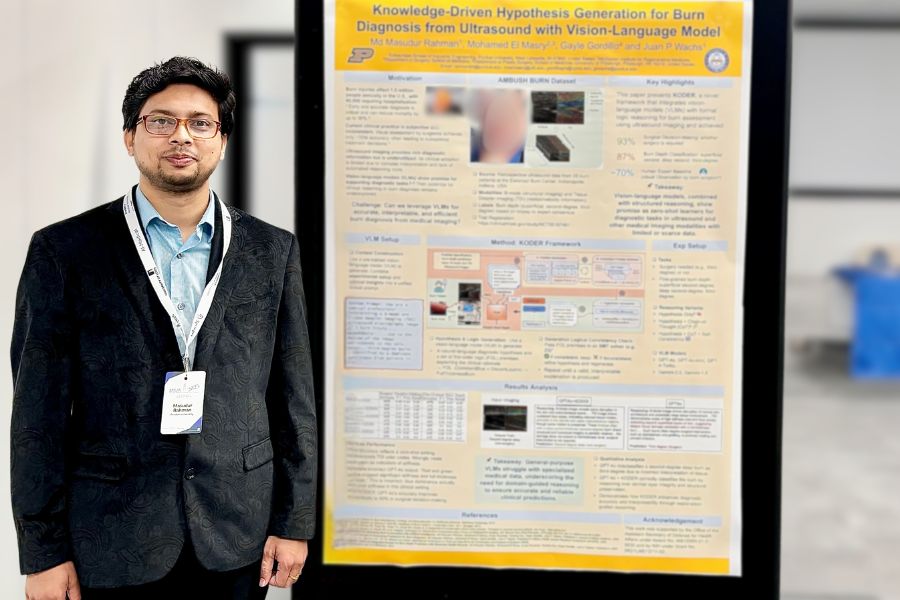Purdue IE Postdoctoral Researcher Wins Best Paper Award at MIUA 2025 for Breakthrough AI Framework in Burn Diagnosis
Purdue IE Postdoctoral Researcher Wins Best Paper Award at MIUA 2025 for Breakthrough AI Framework in Burn Diagnosis
Dr. Md Masudur Rahman was honored for developing KODER, a novel vision-language reasoning framework that improves early burn severity assessment with AI, earning recognition and $400 at the international medical imaging conference in Leeds, UK.
Dr. Md Masudur Rahman, a postdoctoral research assistant in the Edwardson School of Industrial Engineering at Purdue University, has received Best Paper Award in the Full Paper Poster category at the Medical Image Understanding and Analysis (MIUA) 2025 conference, held July 15–17 in Leeds, UK. MIUA awarded $400 and recognized Dr. Rahman's paper, Knowledge-Driven Hypothesis Generation for Burn Diagnosis from Ultrasound with Vision–Language Model, for its novel approach to improving early burn severity assessment using AI-driven medical imaging tools.
In this work, Dr. Rahman and collaborators introduce KODER, a “reasoning framework aimed at improving diagnostic accuracy for ultrasound-based burn assessment.” While vision-language models (VLMs) have shown impressive performance in general computer vision tasks, their application in high-stakes clinical contexts has remained limited due to a lack of robust reasoning capabilities. KODER addresses this gap by integrating pre-trained VLMs with first-order logic reasoning to generate interpretable diagnostic hypotheses.
 Md Masudur Rahman at the MIUA 2025 Conference
Md Masudur Rahman at the MIUA 2025 Conference
The model generates multiple hypotheses from experimental descriptions and clinical insights, refining them through iterative consistency checks using an SMT solver. These validated outputs support both surgical decision-making and fine-grained burn depth classification, with performance gains reaching 93% accuracy in surgical classification and 87% accuracy in burn depth prediction on a retrospective dataset collected from a U.S. burn center.
The team further enhanced KODER with reasoning techniques such as chain-of-thought, self-consistency, and explicit explanation generation, which improved both interpretability and reliability across several state-of-the-art models (including GPT-4o, GPT-4 Turbo, and Gemini 1.5 and 2.0), highlighting the cross-architecture generalizability of the framework. Dr. Rahman’s contributions extend beyond theory to applications in medical and emergency robotics, where intelligent systems must make context-aware decisions in dynamic, uncertain conditions.
The MIUA 2025 recognition builds on a growing portfolio of achievements. Just last month, Dr. Rahman, along with collaborators Dr. Juan Wachs, James H. and Barbara H. Greene Professor of Industrial Engineering, and Dr. Aniket Bera, Associate Professor of Computer Science, were awarded funding through the Health of the Forces Pilot Funding Program for their project, Accelerated Expertise: AI-Powered Diagnostic Pathways for Rapid Clinical Mastery of Burns. This initiative aims to translate AI insights into real-world tools for burn-injured service members, enhancing both acute care and long-term outcomes.
